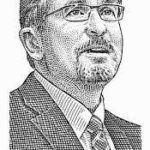 Article by Dr. Joel Beeke (PhD, Westminster Theological Seminary) who has written over one hundred books. He is president and professor of systematic theology and homiletics at Puritan Reformed Theological Seminary, a pastor of the Heritage Reformed Congregation in Grand Rapids, Michigan, as well as the editor of Banner of Sovereign Grace Truth, the editorial director of Reformation Heritage Books, the president of Inheritance Publishers, and vice president of the Dutch Reformed Translation Society.
Article by Dr. Joel Beeke (PhD, Westminster Theological Seminary) who has written over one hundred books. He is president and professor of systematic theology and homiletics at Puritan Reformed Theological Seminary, a pastor of the Heritage Reformed Congregation in Grand Rapids, Michigan, as well as the editor of Banner of Sovereign Grace Truth, the editorial director of Reformation Heritage Books, the president of Inheritance Publishers, and vice president of the Dutch Reformed Translation Society.
(original source here)
Five False Dichotomies
Which is your kind of preaching—expository or relevant? That is an example of a false dichotomy—a logical fallacy. False dichotomies operate under the assumption that there is no alternative, including no way to combine the qualities entailed in the so-called opposites.
One of Satan’s methods to mislead preachers is the false dichotomy. By setting two valid ideas against each other when they really belong together, the devil can use the appeal of one truth to attack another. If we swallow the bait, then the devil’s hook and line pull us away from faithful preaching and we lose both sides of the truth. Here are five myths—false dichotomies—that can catch preachers.
Myth #1: Preachers must be either exegetical lecturers or church motivators.
The exegetical lecturer is the pastoral version of a Bible commentary. The preacher is determined to avoid subjectivism; his sermon will be only the pure Word of God. Consequently, he rarely speaks from his heart to the hearts of his hearers, and they leave with full heads and withered souls.
Offended by the barrenness of that approach, the church motivator seeks not to inform but to transform by convincing people to adopt certain courses of action or programs. However, though he may lace his messages with Bible quotations, he sounds more like a motivational speaker or even a cheerleader than a messenger of God.
The faithful preacher takes the best from both sides of this dichotomy, for he strives—with the Spirit’s blessing—to have his expositions of the Holy Scriptures burn as fuel inflaming the church to holy affection and action.
Myth #2: Preachers must be either spiritual directors or doctrinal instructors.
The spiritual director—a fatherly figure—doles out specific advice to his children in the Lord. His mouth is full of wise counsel and practical directions, but he does not bother much with lofty doctrines of the faith such as the Trinity, the holiness of God, or Christ’s atoning work.
The doctrinal teacher—knowing how shallow Christians can be if they do not know what they believe—thoroughly explains the system of Christian faith revealed in the Holy Scriptures. However, he says little about application, leaving it to the Holy Spirit to apply the general principles of God’s Word to each individual’s life.
In reality, we must avoid both extremes, since “All Scripture . . . is profitable for teaching, for reproof, for correction, and for training in righteousness” (2 Tim. 3:16). The faithful preacher must have his eyes on Christ as revealed in the doctrines of the Bible and his feet on the ground to apply that doctrine to the needs and lives of his hearers.
Myth #3: Preachers must be either verse-by-verse expositors or textual preachers.
Another false dichotomy is set up when we insist that the only way to expound the Scriptures is by preaching through a book of the Bible one verse at a time. Sadly, the verse-by-verse expositor may be so chained to his method that he will not depart from it to address a crying need in the congregation’s life. Continue reading
